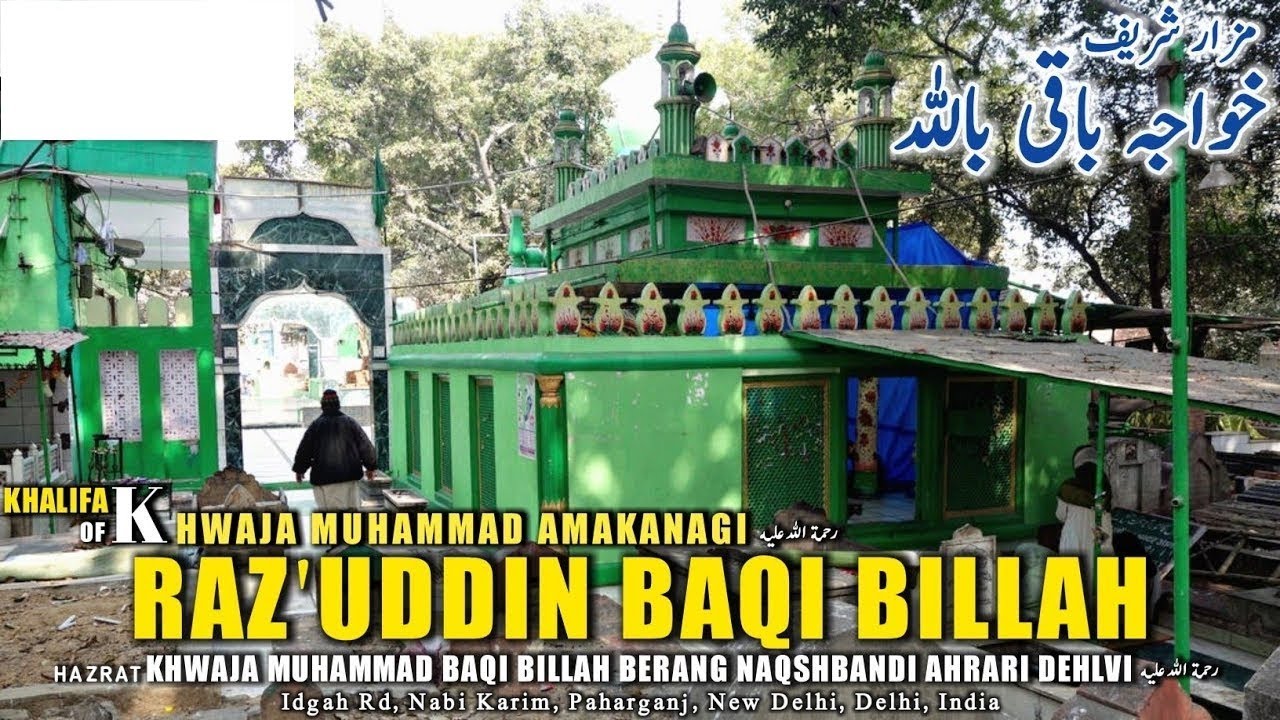Shaykh Abdul Baqi (Khawaja Baqi Billah)
image credit: aalequtub.com
Popularly known as Khawaja Baqi Billah of Kabul, he had migrated to Delhi and was a profound sage presenting the picture of the Quranic verse: "We have not created the jinn and man save for our worship".
Excelling in devotion, piety and holy endeavor, he was very crucible of devotion to God emitting the brilliance of love divine. Born about 971-72 A.H, at Kabul, he took maulana Muhammad Sadiq Halwai as his teacher and accompanied him in his tour to Transoxiana. there he set his heart on betaking the path of spirit and terminated his education to call upon the mystic shaykh's of the era.
First of all he enlisted himself as a disciple of shaykh Khawaja Obaid, a spiritual successor to maulana Lutfullah. Aspiring to attain the highest reaches of divine truth, he took shaykh Iftikhar and then Amir Abdullah of Balkh as his spiritual guides but was nor satisfied till he was mysteriously drawn to Khawaja Baha Uddin Naqshband, who created in him an inclination to follow the path of mysticism requiring strict observance of the holy law.
After some time he came to Kashmir and met Shaykh baba Kubrawi in whose company he acquired excellence and perfection of spirit. it is reported that during this period of his complete absorption in God, the unveiling of a stage that the mystics call fana or extinction was experienced by him. Khawaja Baqi Billah again took to scouring the country for another spiritual mentor after the death of Shaykh baba Kubrawi.
during his travel he had a vision of Khawaja ubaidullah Ahrar from whom he learnt the secrets of Naqshabandiya order. thereafter he took to the road to the region of Transoxiana where he was granted leave by shaykh Muhammad Amkangi to practice the Naqshabandiya discipline and also to enlist disciples in that order only after three days stay with him.
Khawaja Baqi Billah returned to India, stayed for a year at Lahore
where he met the
scholars of the town, then he came down to Delhi
and took up residence in the
fort of Firoz Shah.
The fort had in those days, a spacious mosque and a wide
canal
running besides it. Khawaja Baqi Billah continued to live at this
place
until the end of his life’s journey.
Being
inflamed with the love of God, Khawaja Baqi Billah often gave way to transports
of ecstatic raptures but he always tried to conceal his spiritual excellence
from others owing to his temperamental modesty. if any one asked him to act as his spiritual guide, he normally advised him to seek someone
else perfect in spirit since he was himself devoid of it, and also to let him
know about that attracted soul. Even if he agreed to guide anyone on the path
of spiritual perfection he did so quietly without letting the novice know about
it. On occasions when he had to explain an abstruse point, he gave a most
eloquent dissertation on it. He insisted on his friends not to stand up in his honor, always treated them as his equals and often seated himself with others
on the ground out of courteous humility. The Khawaja had been endowed with a
mysterious spirituality. On whomsoever he cast a momentary look, the man felt
himself attracted to God. He had a tender heart which melted at the slightest sight
of misery to a sentient being.
Khawaja's sterling virtues and his greatness can really be measured from
the number of persons who got spiritual enlightenment through
him within the extremely short period of his stay in India.
The Naqshabandiya order was propagated and made popular
by him in this country. There were hardly few persons in
India who knew anything about it prior to him The Naqshabandiya order reached India through two mystics. One of these was Amir Abul Ala of Akbarabad, nephew and spiritual successor of Abdullah Ahrar, who had permission of his uncle to take disciples, but his method combined the disciplines o f the Naqshabandiya and Chishtiya orders. Its centers were Kalpi, Marehra, Danapur and a few other places. The second mystic was Khawaja Baqi Billah. From India it spread to other countries of the Muslim world through the efforts of his disciples.
Khawaja Baqi Billah's disciples included such illustrious
men of God as the Mujaddid, Shaikh Taj-ud-din b. Sultan Uthmani of Sambhal,
Shaikh Hosam-ud-din b. Shaikh Nizamud-dln of Badakhshan and Shaikh Alladad of
Delhi. His writings consist of several tracts on mysticism, letters and poetic
compositions. In the Silsilatul Ahrar be has given an exposition of his
mystical quatrains. The Khawaja died on 14th Jamada-ul-Akhir, 1014 A.H.1 at the
age of forty years and four months and was buried at Qadam Rasul in western
Delhi where his grave is still visited by people in large numbers.
Mujaddid Alf Thani's meeting and his spiritual Allegiance to Khawaja Baqi Billah shall be discussed in detail in upcoming blogs.

Comments
Post a Comment